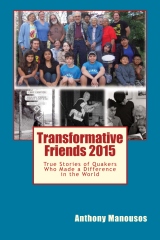I was very moved yesterday when Jill and I went to Santa Monica and saw Veterans for Peace taking down the crosses they placed there to remember those who died in recent wars since 9/11. Every Sunday, Memorial and Veterans Day since 9/11 these peace-loving veterans have faithfully placed crosses on the beach and reminded people of the cost of war.
I was also moved by Chuck Fager's essay entitled "Quaker Memorial Day" in which he tells the story of Southern Quaker during the Civil War who paid a huge price for standing up for his convictions.
Many Quakers did go to war, but those who remained faithful to our Peace Testimony deserve to be remembered and honored on this day. On this day, I'd like to lift up Bill Lovett, a beloved and respected member of the Pacific Yearly Meeting since
coming to California with his family in 1965. A birth-right Friend whose family
became Quakers in the time of William Penn, Bill was born in 1923 in
Fallsington, a small rural Quaker community in Pennsylvania not far from the
Delaware River. He has been a passionate pacifist all his life and served time
in prison during World War II because of his uncompromising commitment to
conscientious objection. Bill refused to seek CO status as a Quaker because he
wanted CO status to be extended to non-religious people of conscience. Bill became involved in helping low-income
farm workers in the Central Valley build affordable homes through Self-Help
Enterprises, a precursor to Habitat for Humanity.
I came to know Bill through the Youth
Service Program that I helped to start for Southern California Quarterly
Meeting and the American Friends Service Committee (AFSC). In 1994, I took a
youth group to the Central Valley to do a project with Self-Help Enterprises
and we stayed at the Visalia Meetinghouse. There Bill shared with us his
amazing story, much to the delight of our young volunteers. I must add that
when my wife Jill heard Bill’s story at a PYM gathering, she was so impressed
she insisted we stop off in Visalia and record it. The afternoon we spent with
the Lovetts at Quaker Oaks Farm was an unforgettable experience, Here's the story of how Bill came to be a war resister during World War II. When the draft was reinstated, Bill was an 18-year-old volunteer working an AFSC work camp in Mexico.
While
Bill was in Mexico, the draft age was lowered to 18. All American males of
draft age had to register. Bill and several of his friends decided to send a
letter to the Attorney General saying that they would not register for the
draft. This was a radical decision since by not registering Bill could face
severe penalties, including prison. If he did register, he could receive
Conscientious Objector (CO) status as a Quaker and would be eligible for a deferment.
At most, he would have to do alternative service in a Civilian Public Service
(CPS) camp. But Bill’s commitment to the Quaker Testimony of Equality prevented
him from taking this easier route. He wanted every person of conscience to have
CO status, not just those who belonged to historic peace churches like the
Quakers, Mennonites, and Brethren
They were released on their own recognizance, as often happened in
such cases. Bill took a bus back to Fallsington and stayed with his family
while awaiting trial. Bill was tried in Philadelphia and received a three-year
sentence to Lewisburg Prison, a maximum security facility in Northwest
Pennsylvania.
“Being in a federal prison was pretty educational,” recalled Bill,
smiling.
Of the 1,200 prisoners, 120 were there for refusing to be drafted.
Many of the other prisoners were incarcerated for violating laws relating to
alcohol—they were known as “moon shiners”. One of the most
famous prisoners at Lewisberg was Dave Dellinger, pacifist and advocate for
nonviolent social change, perhaps best known for being one of the Chicago Seven
arrested for disrupting the Democratic National Convention in 1968. Dellinger
came from a prominent New England family, attended Yale, Oxford and Union
Theological Seminary. Like Bill, he was imprisoned for taking what some called
an “absolutist stance”—refusing to register for the draft, even though he was
also eligible for a CO deferment.
While in prison, Bill and others became concerned about the
treatment of their fellow prisoners. They were especially disturbed by racial
segregation: blacks and whites lived and dined in separate areas.
“Just because you’re in prison,” recalled Bill, “doesn’t mean you
close your eyes to racial abuse. So we went on a work strike which eventually
escalated to a hunger strike.”
Initially strikers were put in solitary confinement. They
communicated with other prisoners by slipping hand-printed newspapers under
doors. But as their numbers increased they were housed in a dorm of 15-30
inmates. Bill refused to eat for 30 days and eventually was force-fed by prison
guards.
“They didn’t know how to deal with us” Lovett said, explaining how
the threat of solitary confinement or loss of good time release was wasted on
conscientious objectors who planned on spending the duration of the war in
prison. “We didn’t fight, but we had moral issues. We brought a little bit of
democracy into the prisons.”
They used their privileged
status to get the attention of political leaders. Most of the inmates were
abandoned by the families, recalled Bill, but he and his fellow war resisters
had strong support from their family and their religious communities. They used
these connections to pressure prison officials in Washington. The prison dining
halls were ultimately integrated due to their efforts.
To learn more, go to https://www.createspace.com/4832073


Bill is a wonderful friend. I am honored to know him.
ReplyDelete